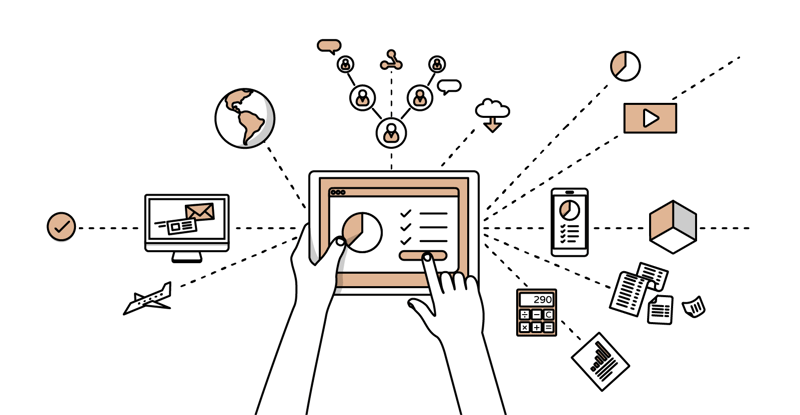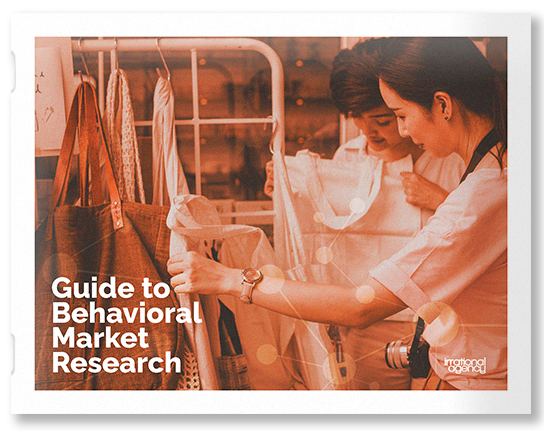
4 Behavioral Science Best Practices for Uncovering Hidden Consumer Truths
 Irrational Agency
Irrational Agency
Let's face it, people can rarely articulate what motivates them when put on the spot or in an immediate moment. Our brains have to move incredibly fast in an attempt to keep up with all of the information we are constantly absorbing, and uncovering purchase motivations can be an arduous task. Thankfully, we can call behavioral science to the rescue.
Let’s imagine that you decide to order food from a new restaurant or finally try a trial from a home meal kit. The restaurant or meal-kit company immediately sends out a survey and asks you where you heard of them and what inspired you to give them a try. Well, let’s think back... Where did you hear about them? Did you stumble upon the brand just from a rightly-timed email or social media ping? Did a friend mention the brand in an earlier conversation that week, or did the celebrity influencer's video exalting the meals' convenience and nutritional value worm its way into your unconscious mind?
The answer is probably all of the above with the additional motivation of feeling just too exhausted (with no healthy ingredients in-house) to figure out what to make for dinner.
Your customers may "think" they can tell you what persuades them and they may "believe" that they are driven by logical factors such as the quality of the brand, product, service, or experience. However, most customer decisions are instinctively driven by emotions and the unconscious. This isn’t entirely new knowledge, of course. Most people are aware that emotions and the unconscious drive their decisions, in fact, many professional occupations rely on a basic understanding of customer instinct and emotions.
But having a base knowledge of how this works, and having a scientific way of measuring what is happening in the unconscious mind are two different things. Uncovering what, how, where, and when a customer becomes interested or emotionally connected to your brand can deliver data to help brands do everything from improving products and experiences to encouraging the customer to care more about or choose your brand even when the competition is fierce.
Behavioral Science in Market Research
Essentially, behavioral science is the study of people's decision-making steps and routine habits. The umbrella term of behavioral science consists of the critical investigation of human action within psychology, cognitive science, sociology, anthropology, neuromarketing, and economics. Discovering what your customers and potential clients will consider compelling, emotionally charged, or convenient is paramount to luring them in and maintaining loyalty. But how do you acquire this knowledge effectively and consistently? Behavioral market research is one reliable way to build that into your business process.
The most cutting-edge research organizations utilize behavioral science by collecting small but rich data like focus group or IDI feedback, big data such as web analytics, and quantitative research to review physical and digital patterns that impact decisions. Just as the top marketing firms jump at the "be everywhere" strategy these days, market research firms (like Irrational Agency) are looking at all aspects of buying, attention, and click-rates.

Delving deeper, what actions or steps are leading research agencies actually take to this new world of behavioral science market research? Well, for one, Irrational Agency does not rely on online surveys or focus groups alone. We review all influential data sources, such as feedback from internal stakeholders, web analytics, and ethnographic data - to unearth fast purchase journeys, new customer opportunities, and discover the ‘why’ behind consumer behaviors and attitudes to your brand.
How Is Behavioral Science Consulting Effective?
As we all know, people don't always do as they say or even do as they "think" they will do. While projecting future buying habits is difficult, using a large quantity of data from various sources and analyzing it creates a more complex and well-rounded picture of consumer behaviors.
Now, we’re only touching upon the surface of behavioral science within consumer decisions with much to be learned about the intricacies behind the practice. This is where working with behavioral science consultants creates an advantage for your brand.
4 Best Practices to Look for in Consultants
- Eliminating biases from research. Selection bias comes first: the first participants to raise their hands to be included in focus groups may also be the loudest and most opinionated. While your behavioral science partner is choosing a few of these types may be wise, be aware that you don't want the most vocal to dominate the research activity. Consultants with the best practices in behavioral consultancy will seek a balanced sample in line with the brand's desired representative mix. Behavioral biases are second: everyone reveals their unconscious shortcuts and irrationalities when answering questions, and these need to be corrected when analyzing the results.
- Flexibility in qualitative discussions and quantitative methods. Of course, there is always a discussion guide. Be aware that while you and your behavioral research consultant are looking for trends among respondents, providing extra time for customer tangents or feedback that is not expected means actively resisting confirmation bias and the possibility of fresh perspectives. Being able to go beyond standard survey designs will unearth new kinds of data and new insights.
- Follow the customer back to where everything started, and forward through their whole experience. Are your behavioral science resources investigating how customers formed their earliest narratives about your brand, where they are reminded of it, what colors and copy speak to customers' pain and cravings, what visuals move customers smoothly and actively through your call to action, and how they experience your product? While compiling a report of findings is a good place to start the research process, do your specialists help infuse these discoveries throughout the customer journey? Diligence in testing and re-testing are vital in ensuring loyalty. When you add behavioral science, you are looking for the message and strategy that makes consumers want to choose your brand. That could happen anywhere in the customer's lifecycle.
- Use of the whole behavioral science arsenal. Behavioral science consultants know that customers are looking for choices that either add value or reduce cost, and they prefer brands that have their best interest in mind. An example of an established behavioral research insight is how customers remember the last portion of their experience much better than their first interaction. For instance, have you noticed how restaurants offer free dessert choices when you send the check, or how other clients may provide a last-minute discount before checkout? The idea is to sweeten those last moments of interaction between brand and consumer enough to persuade the customer to come again.
Today, user experiences, consumer ratings, and journeys may be transformed and substantially improved using behavioral science consulting resources and implementing them within market research strategy. Leveraging the skill of a strategic and experienced market research partner like Irrational Agency will deliver a competitive advantage in fast-changing, ever-more-digital markets. Get a head start and download our guide to behavioral market research below!

